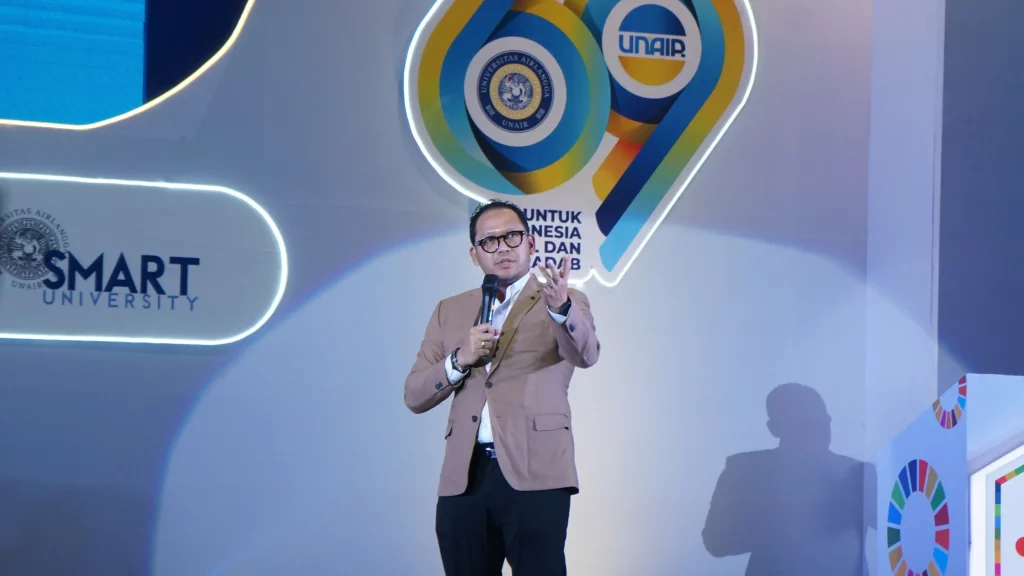UNAIR NEWS – UNICEF Indonesia says universities play an important role in achieving SDGs (Sustainable Development Goals) 2030. It was conveyed directly by Tubagus Arie Rukmantara, Chief of Field Office UNICEF Indonesia for Java and Bali, at the SDGs Festival Universitas Airlangga (UNAIR) 2023. The event took place from Monday, Nov 20, 2023, to Wednesday, Nov 22, 2023, in the Garuda Mukti Hall, Management Office, UNAIR MERR-C Campus.
Opening the presentation, Arie said that the international world only has seven years left to achieve the 2030 SDGs. However, in reality, there are still various global problems that hinder the achievement of this goal.
There are at least three main problems: the pandemic crisis, conflict, and climate change. Children are a group that is vulnerable to experiencing negative impacts from these problems. In fact, children should be the ones who experience the results of SDGs achievements. “In 2022, UNICEF recorded that around 10.5 million children in the world lose their parents due to the pandemic. Meanwhile, more than 30 million children in the world have been neglected due to conflict, and more than one million children are at high risk of being affected by the climate crisis,” said Arie.
Indonesian conditions
In Indonesia, said Arie, one of the problems that children are vulnerable to is education. According to UNICEF records, education for children in Indonesia is still far from inclusive. Only around 29 percent of children with special needs complete their education up to the high school level.
Children are also vulnerable to becoming victims of violence. UNICEF data shows that four out of ten young people aged 18-24 years have experienced violence before they turned 18 years old. Another problem is that one in three children aged 10-17 years have mental health problems. “There are many problems related to the young generation in Indonesia. In the education sector, for example, education for children is still not inclusive. Another problem is mental health problems,” said Arie.
Role of universities
Seeing the complexity of the problem, Arie said that the government needs to improve health services specifically for children and adolescents. The government, he continued, can utilize technology to provide cellular services that cover various adolescent health problems. “We recommend providing special health services to children and adolescents at every community health center throughout Indonesia. The provision of this service must, of course, be youth-friendly, and access can be online or offline,” explained Arie.
To implement this recommendation, there needs to be collaboration between various parties, including universities. Together with UNAIR, UNICEF Indonesia has collaborated to solve various health problems among children in the East Java region.
Some of the collaborations are, for example, through UNAIR’s GELIAT (Caring Movement for Healthy Mothers and Infants). GELIAT has various programs to improve the welfare of mothers and infants, for example, through providing immunizations and preventing stunting. “In this case, UNICEF does not work alone but collaborates with the government, NGOs (Non-Governmental Organizations), and universities to face challenges related to children’s human rights, health, education and a decent life for them,” emphasized Arie.
In the end, Arie hoped that UNAIR could collaborate with policymakers to increase investment and education to improve the lives of children in Surabaya. “Together with the SDGs Center, we can engage with the private sector and media to achieve these goals. Moreover, we all know that Surabaya is a city with a high level of business, so we can take advantage of this,” he concluded.
Author: Yulia Rohmawati
Editor: Feri Fenoria









